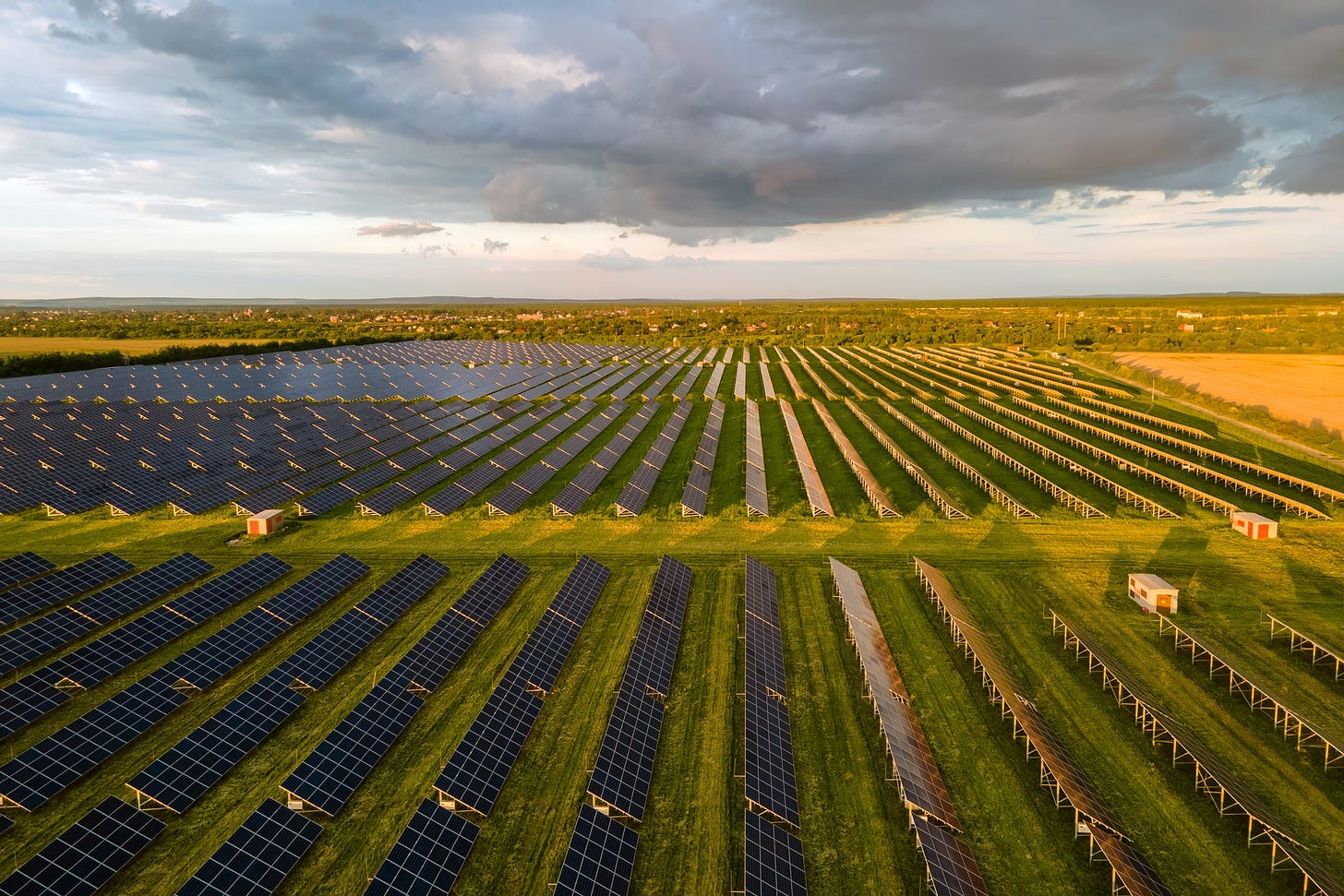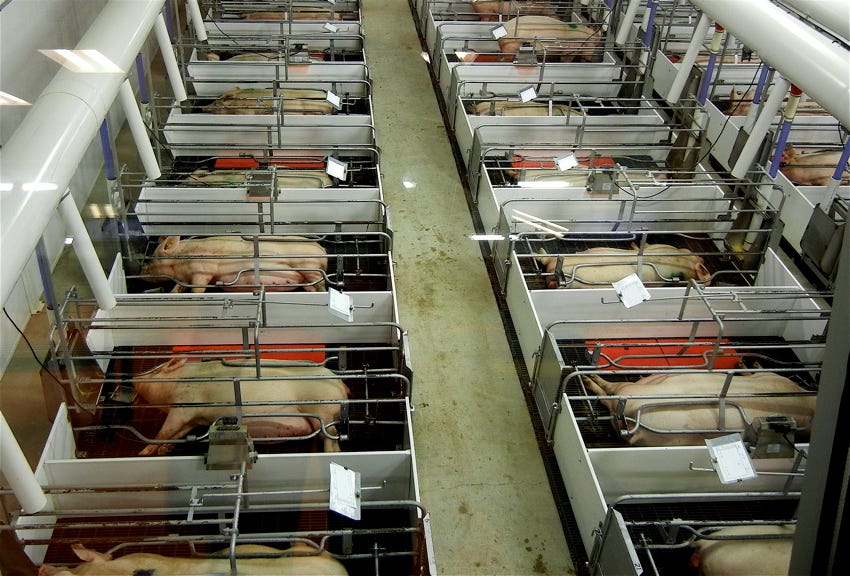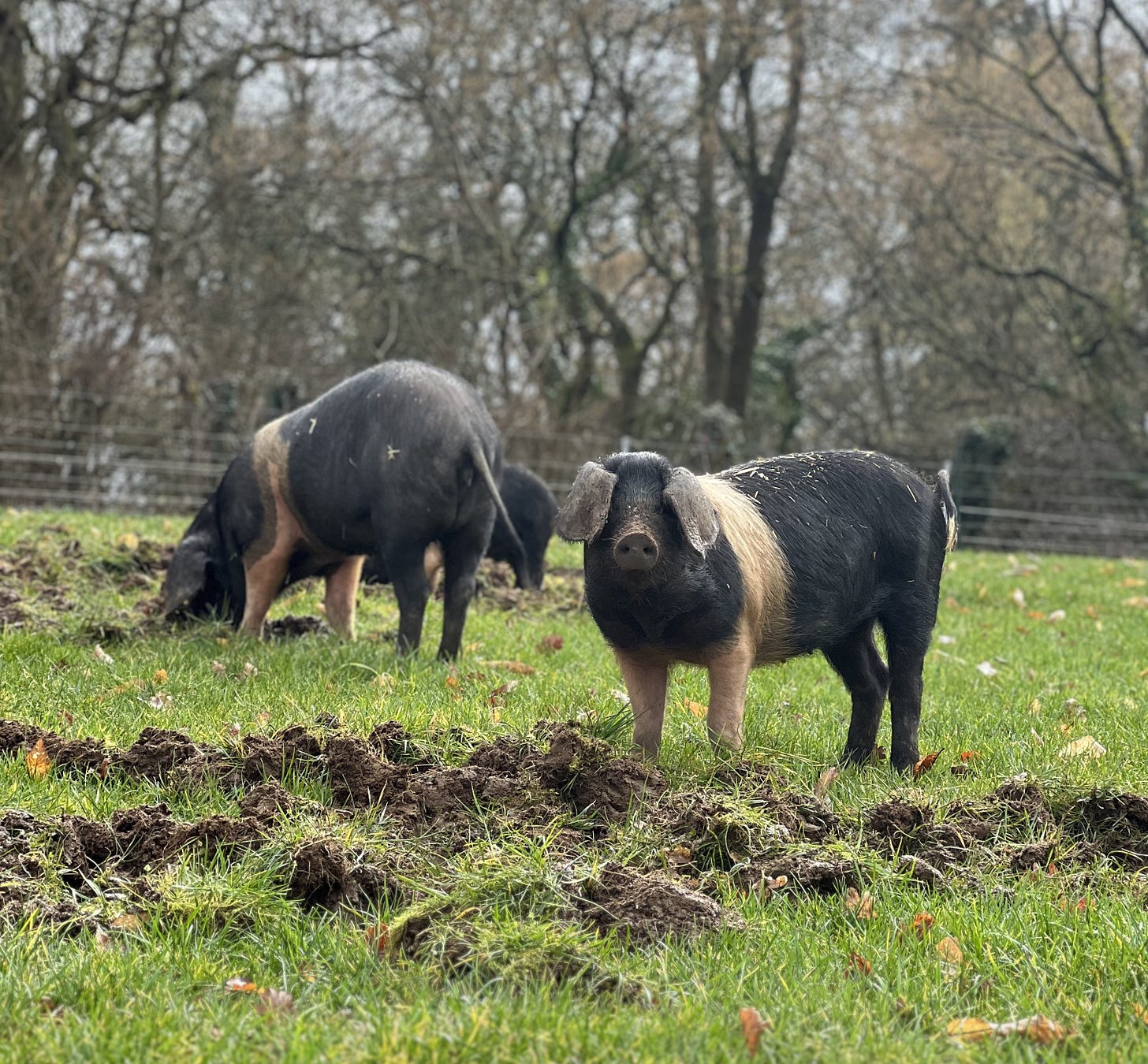The Meat of the Matter
Why Cutting Livestock Isn’t the Answer
Picture this: early morning on a British farm, dew glistening on the fields, pigs rooting happily for acorns under ancient oaks. It’s hard to believe this scene is the problem. Yet, if you read the latest government reports and NGO briefings, or media headlines, you’d think livestock farmers like me are the villains behind the climate crisis and biodiversity loss.
The Food Foundation’s latest report hit my inbox, and it’s the same old story: eat less meat, embrace plants, and pin your hopes on lab-grown burgers or cricket snacks all for the cause of Net Zero & Climate Change. As an organisation advising the UK government on food strategy, their words carry weight. After the National Food Strategy White Paper, they criticised the government for lacking “ambition.” Translation? They want ministers to commit to WHO and Climate Change Committee targets, a 25–35% cut in meat consumption by 2030.
This isn’t just advice, it’s a roadmap. “Healthy, affordable, sustainable” sounds great, but the fine print reveals a future of more soya, more beans, and protein from petri dishes or insect farms. Who’s deciding this? Not farmers. Not consumers. It’s a top-down agenda, and it’s making progress.
Don’t get me wrong I have nothing against eating a vegetarian meal occasionally. But the idea that plant-based diets are automatically better for health, the planet, or farmers doesn’t hold up. Many “sustainable” alternatives are ultra-processed, shipped across the globe, and rely on chemical-heavy monocultures. Not to mention the hidden costs of biodiversity loss from soya fields, the carbon footprint of imported avocados and almonds, or the erosion of rural skills and food culture. Swapping pasture for mono-crops isn’t the win we’re told it is.
Lab-grown meat is the food-tech world’s answer to climate change backed by slick marketing and venture capital. Guilt-free protein? Not so fast:
Health - No long-term studies prove it’s safe. It’s ultra-processed by nature, and the chemical cocktail used to grow it isn’t exactly appetising. Not to mention the cells to grow lab-grown meat normally come from an animal, and I often ask myself if that still makes it suitable to vegans? A Riverford delegate at the Oxford Real Farming Conference put it bluntly: “The process is so unpalatable, they won’t share the details.”
Environment - A 2023 UC Davis study found lab-grown meat could emit up to 25 times more greenhouse gases than beef at scale with current tech. Imagine the comparison between the emission from pasture-fed beef!
Control - Patents and production are owned by corporations, not farmers. This isn’t food freedom it’s centralisation & control.
Crickets and mealworms are pitched as “sustainable” protein. Maybe they work elsewhere, but Britain’s land is perfect for grazing animals that turn grass into nourishment. Why push bugs when our food heritage, pasture-fed livestock, is being sidelined? It feels like a deliberate pivot away from what works here.
Net zero is the buzzword du jour, often wielded to vilify farmers. But as George Monbiot points out, the UK government’s net zero targets are riddled with loopholes and creative accounting that let real environmental issues, like land use, biodiversity, and food production, slip through the cracks. The focus on headline targets often masks a lack of meaningful action.
Grazing livestock, especially in regenerative systems, aren’t the climate villains they’re painted as. The real culprits? Industrial farming, cheap imports, and land lost to development or solar farms. Blaming small farmers is just an easy dodge!
Not all NGOs are pushing the same “less meat” agenda. The Sustainable Food Trust recently released a report called “It’s Not the Cow, It’s the How” and it’s a refreshing change from the usual narrative. Their research backs up what many of us on the ground have always said: grazing livestock aren’t the climate villains. It’s industrial farming, poor land management, and the relentless drive for maximum output that do the real damage.
As I quoted in my post The Future of Livestock Farming:
“This report clearly demonstrates the need to differentiate between livestock that are part of the problem and those that are an essential part of the solution. In other words, it’s not the cow, it’s the how.” – Patrick Holden, CEO of the Sustainable Food Trust
The Sustainable Food Trust findings are well-managed, pasture-based livestock systems can actually support biodiversity, build soil health, and even help sequester carbon. Organic and regenerative farms have more earthworms, more birds, and more pollinators than conventional systems. It’s not about the cow, it’s about how we farm. Ive seen this firsthand with grazing our pigs, when used in a well-managed rotation the pigs foraging actually benefitted the pasture regrowth and biodiversity.
That said, even the Sustainable Food Trust still frames their recommendations around meeting net zero targets. And while I respect their science, I’m increasingly sceptical that “net zero” is the right measure for real change especially when it’s used to justify policies that threaten small, pasture-based farms.
The RSPCA’s “Future of Food and Farming” stance argues that cutting meat consumption is the only way to reduce low-welfare meat. As someone who’s raised pigs outdoors for years, I disagree. High-welfare farming, where animals thrive on pasture, is the answer, not eating less meat. The RSPCA Assured label often feels more like marketing than meaningful change. I mean honesty can’t we just fix the issues with low-welfare farming by banning factory farming!
This is about who controls our food, who gets to farm, and whether our countryside stays alive or becomes a sterile grid of solar panels and sheds. The threads connect livestock cuts, net zero, cheap imports, and land grabs for housing or infrastructure. If we don’t act, real food, born of soil, rain, and care, will be replaced by patented products and empty promises.
Pasture-fed, free-range animals are as natural to this land as the hills themselves.
Change isn’t the enemy. We need better meat, support for small farms, and investment in local food systems - not less meat.
But we also need truth, a willingness to question headlines and ask who profits from these “solutions.” Farmers, consumers, and communities deserve a seat at the table
What do you think? Would you choose pasture-raised pork or a lab-grown patty? Are you concerned about where food policy is heading? Share your thoughts below I’d love to hear your take.
If you value honest, independent analysis from the farm gate, please consider subscribing to Me, My Pigs and I. Your support helps keep this work going and keeps the conversation real.
If just 5% of my readers tipped £1/$1 this essay would pay for itself in terms of time spent working on it.







I hate the whole climate change/ Net Zero nonsense.
I would take a hell of a lot of cow farts to make up for one volcano fart.
I appreciate your posts, as it’s becoming clear that this idea of preserving biodiversity in wildlife preserves that we manage, but not for food, is a myopic way of looking at biodiversity.
The English countryside is teeming with wildlife, as well as livestock.
The hedgerows are an ingenious, traditional network of wildlife corridors.
I have long been pondering why animal farming, generally, is vilified, rather than correctly identifying factory farming as the primary culprit of agricultural pollution.
I keep thinking about the laws in the UK, somewhat relaxed now, restricting hunting to the upper classes.
I think instead of granting aristocrats exclusive hunting rights and vast land holdings, though some still get that, a religion has been created for the masses to follow:
Eating plants, crickets and such, which are grown in vast factory farms is ‘virtuous’.
Huge, pesticide-laden monocultures of corn are required to “feed the world”.
Lab grown meat is more “net zero” than pasture grown meat.
Giving up land, for vast mechanized farms and biodiversity preserves, to live in a tiny house or pod will “save the planet”.
Those are the rules for the peasants.
The wealthy will be able to eat, hunt and generally do what they want on their vast, private estates or they will be the only ones able to afford to do so on ‘our’ biodiversity preserves.
What do you think?
Is there a vast conspiracy to create an economic, cricket-eating class for the wealthy to rule over…
or, has a rank and absurd political ideology simply metastasized across our academic institutions, media and governments?
The concept of being a conservative, who wants to protect traditional values and practices has been vilified.
Isn’t that odd, given how much progressive ideology elevates the creation of ‘preserves’ for ‘conservation’ purposes.
There haven’t been truly wild places since humans have inhabited basically everywhere. Isn’t it artificial for us to pretend that a wildlife preserve can mimic a human-free landscape?
Why can’t biodiversity be something we live amidst instead of keeping it sequestered and ‘out there’?